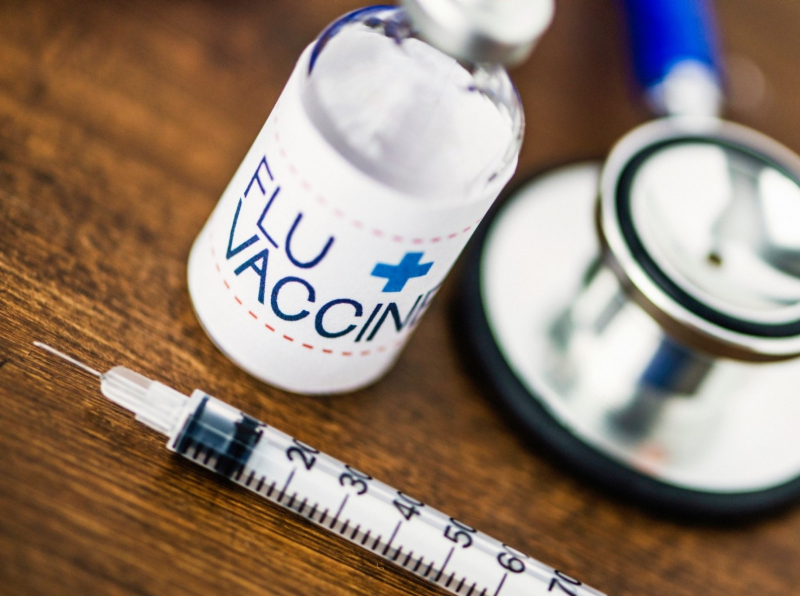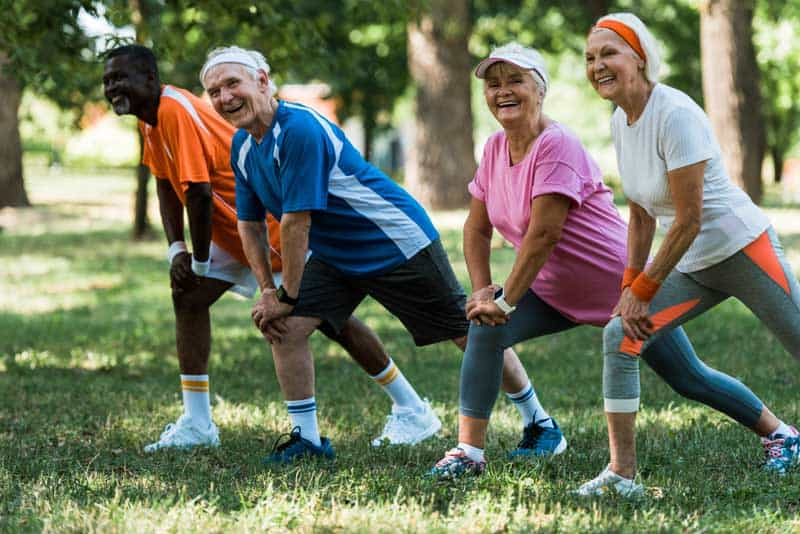Top 8 Best Tips to Boost Immune System for Older Adults
The flu season normally lasts from October through May in the United States. Every year, people of all ages are affected by the flu virus, which causes ... read more...symptoms including coughing, runny nose, fever, chills, body aches, and headaches. Some people with the flu may not experience any significant issues, but people 65 and older are at an increased risk of complications. The cause of this is that older people typically have weaker immune systems. Here are some tips for boosting your immune system if you're over 65 and want to help fight the flu and other viruses.
-
One of the greatest methods to guard against the virus is to get your annual flu vaccine. According to studies, getting the flu shot cuts the chance of hospitalization in older people by 40% and can lower the overall chance of getting the flu by 40% to 60%. The vaccination works by stimulating the production of antibodies by your immune system. This helps in preventing infection. There are various flu vaccines. Some vaccines are available to people of all ages.
For adults 65 and above, Fluzone High-Dose and Fluad Quadrivalent are specifically recommended.
- Fluzone High-Dose: Four times as many antigens as the typical vaccine are present in this vaccine. When there are more antigens available, your body produces more antibodies to protect you from the flu. Compared to those who received the normal flu shot, those who received the high-dose vaccine had a 24% lower rate of flu infections.
- Fluad Quadrivalent: The MF59 adjuvant is an additional component of this vaccine. This increases your immune system's response and produces more antibodies that will protect you from the flu.

Get a flu vaccination 
Get a flu vaccination -
A healthy, nutrient-rich diet is a key component in boosting your immune system. Consuming a lot of fruits and vegetables, which are rich in nutrients and antioxidants that support good health, is one of the great ways to do this. The immune system is maintained by a variety of vitamins and minerals. Eating a variety of foods is the greatest method to satisfy your needs.
Particular nutrients that are important for immune health include:
- Vitamins B: Dairy goods, grains, meats, eggs, and legumes all contain B vitamins. In older adults, vitamin B12 deficiency is common. If you require a supplement, ask your doctor.
- Vitamin C: Numerous fruits and vegetables, particularly those that are red and orange in color and citrus fruits, contain vitamin C. The majority of people can receive all they need through food, therefore supplements are usually unnecessary.
- Selenium: Numerous foods contain small amounts of the antioxidant selenium. These include grains, meats, and nuts.
- Zinc: Zinc is high in food including oysters, cheese, beans, lentils, and beef. The majority of people can obtain enough nutrients through their diets, but in certain circumstances, a supplement may be advised.
There is some proof that a Mediterranean diet can help maintain healthy immune function. Additionally, a Mediterranean diet can help in the prevention and treatment of chronic diseases. This particular diet has a lot of beans, whole grains, fruits, and vegetables. Additionally, it highlights the importance of healthy fats from foods like fish, olive oil, nuts, seeds, and olives.

Eat a nutrient-dense diet 
Eat a nutrient-dense diet -
As you age, it's important to keep moving because exercise has so many advantages. As you age, it can keep you active and powerful. Additionally, exercise improves blood flow and reduces inflammation in the body.
Additionally, regular physical activity has been linked to improved immune function, according to a 2020 study. Being active is thought to improve the body's ability to detect harmful invaders. Exercises help detox the lymphatic system and, as an added benefit, improve mood by releasing endorphins that make you feel better. As a reminder, all exercise is effective in moderation. Start out slowly to get your body used to more activity, and if you experience discomfort or other difficulties, think about working with a physical therapist.
The Centers for Disease Control and Prevention (CDC) advises the following for older adults:
- At least 150 minutes of moderately intense activity every week
- Muscle-building exercises twice a week.

Keep moving 
Keep moving -
Chronic stress can have many negative effects on the body, including lowering your immune response. When under stress, the body increases the production of a hormone called cortisol.
Cortisol helps the body deal with stressful situations. It also limits certain bodily functions that aren’t essential in a fight-or-flight situation. This includes the immune system. Over time, this limited function of the immune system can make you more susceptible to infection. It’s difficult to live a life that is completely free of stress, so learning how to manage stress when it arises may be the most helpful option.
Some options include:
- Make time for things that you find enjoyable and relaxing, like reading or gardening; exercising
- Try mindfulness or meditation strategies
- Work with a therapist if you're having problems managing your stress

Manage stress 
Manage stress -
As you get older, getting good sleep becomes more important. Getting enough sleep can enhance memory, focus, and brain function. On the other hand, a lack of sleep can lead to a variety of problems, including a decrease in the immune system's effectiveness.
Try one of these methods to improve the quality of your sleep:
- Make sure your room is dark, quiet, and cool
- Keep a regular bedtime routine when possible
- Limit daytime naps to about 45 minutes
- Avoid caffeine later in the day
- Limit alcohol, as it may interfere with sleep quality
Ideally, our bodies require seven to nine hours of quality sleep to recharge and keep our immune systems strong. Consult your doctor if you suffer from insomnia or other issues that keep you up at night to determine whether there may be any underlying causes.

Get plenty of sleep 
Get plenty of sleep -
There are trillions of small living organisms inside of you. Numerous beneficial bacteria, fungi, viruses, and protozoa make up your microbiome. The majority of them are found in the gut and are important to your overall health. Your stomach may be a key factor if you want to strengthen your immune system. Your immune system and your gut health are linked, and changes to one can have an impact on the other. According to 2018 research, when your gut microbiome is healthy, your immune system is able to detect and fight off infection.
Here are some steps you can do to keep your gut microbiota in good condition:
- Eat a lot of foods high in fiber, such as fruits, vegetables, beans, whole grains, nuts, and seeds.
- Try kefir, yoghurt, kombucha, tempeh, miso, kimchi, and sauerkraut as well as other fermented foods.
- Use antibiotics only as necessary.

Support your gut health 
Support your gut health -
Cigarette smoke contains compounds that are known to harm lung tissue and raise the risk of cancer. According to a study from 2016, smoking can also lower your immune response. Smokers are more likely to develop respiratory conditions like pneumonia, the flu, and bronchitis. Consider quitting or cutting back on smoking to enhance the health of your immune system. There are various methods to stop smoking, including nicotine gum or patches. Therapy or support groups might be beneficial for some people as well. You might also consider prescription drugs with your doctor in order to lessen your cigarette cravings.
You can cut down by:
- Slowly increase the time between cigarettes
- Reduce the number of cigarettes in your packet each day
- Avoid situations that will trigger a desire to smoke
- Nicotine replacement therapy (NRT)

Quit smoking 
Quit smoking -
There are numerous advantages to being outside for your health. Many people discover that spending time in nature helps them feel less stressed. Vitamin D from moderate sun exposure is an additional benefit of spending time outside.
The immune system is strengthened by vitamin D. When your vitamin D levels are adequate, they may help prevent the development of autoimmune disorders and inflammation. According to a 2017 review, vitamin D might also help with the prevention of some infections. Researchers analyzed more than 11,000 patients and discovered that those who took vitamin D supplements had fewer respiratory infections. Besides this, you can add some foods that naturally contain vitamin D such as:
- Cod liver oil
- Salmon
- Swordfish
- Tuna fish
- Orange juice fortified with vitamin D

Spend time outdoors 
Spend time outdoors





























